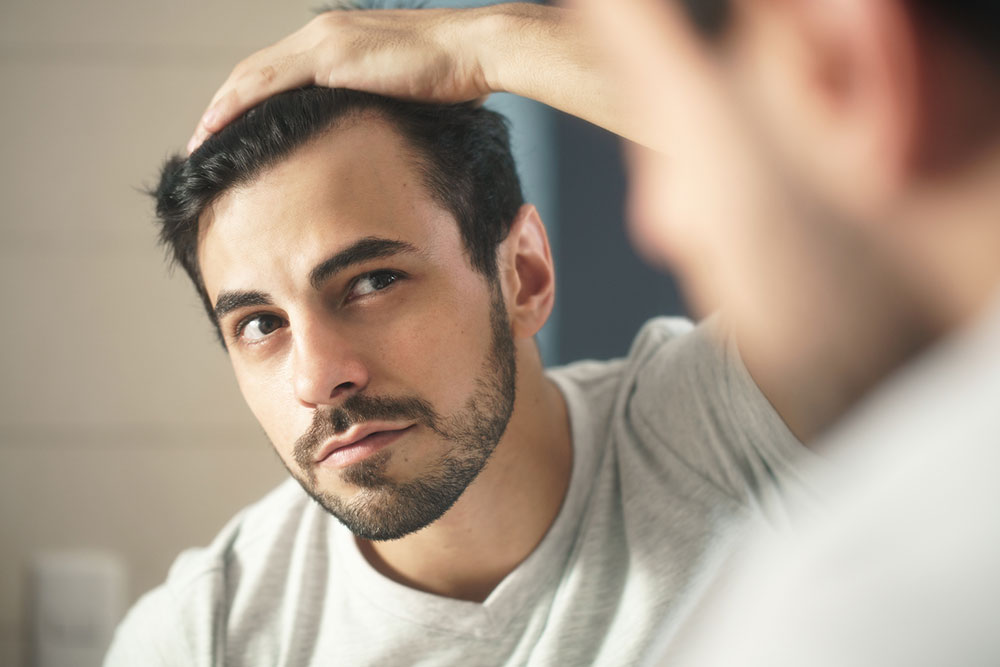10 Natural Remedies That Help Fight Alopecia Areata
Alopecia areata is an autoimmune health condition in which one loses hair in patches or clumps. While hair loss is common on the scalp, those affected may also lose hair from their eyebrows and eyelashes. Essentially, here the immune system begins attacking hair follicles, causing severe hair loss. While one should immediately consult a doctor and take the prescribed treatment, some natural remedies and treatments at home can also help control the symptoms.

Crushed garlic with coconut oil
Coconut oil penetrates the roots of hair, stimulating hair growth. Also, garlic has several natural antimicrobial and antibacterial properties and does wonders for the scalp. So, a combination of garlic and coconut oil can be an effective solution to control the symptoms of alopecia areata.
Fenugreek paste
The dihydrotestosterone (DHT) hormone is associated with hair growth, but its imbalance can trigger alopecia areata. Fenugreek is known to prevent DHT imbalance in the body, reducing hair loss in the process . To prepare this paste, soak a handful of fenugreek seeds in water overnight, blend them into a smooth paste, and apply this paste to the scalp. This can promote healthy hair growth.
Onion juice on the scalp
An established home remedy for those with alopecia areata, onion juice can contribute to hair growth and also improve blood circulation. It’s an easy-to-use remedy specifically for hair regrowth and hair health.
Bright-colored fruits and vegetables
Orange and yellow fruits have high beta-carotene content, which triggers the production of vitamin A in the body. Vitamin A, a fat-soluble micronutrient, is crucial for healthy hair growth. To boost the intake of this important nutrient, add bright-colored fruits and vegetables, such as bell peppers, tomatoes, beetroots, strawberries, squash, carrots, and sweet potatoes to regular meals, especially when dealing with alopecia areata.
Aloe vera gel
This natural ingredient is believed to be an effective solution for those affected by hair and skin issues. Some researchers suggest that aloenin, an important component in aloe vera, promotes hair growth, particularly among those with the hair-thinning condition.
Biotin-rich foods
Biotin, or B7, produces keratin in the body, making it an essential element for hair growth. Some foods that boost biotin intake are seeds, nuts, legumes, egg yolks, meats, and bananas. Those with alopecia areata should consider including them in their meals to expedite healing.
Hibiscus and dandelion oil
The flowers help replenish the scalp with the nutrients needed to stimulate hair growth from dormant follicles. Dandelion root is also commonly recommended for hair growth, as it reduces scalp inflammation. So, the combination of hibiscus petals and dandelion oil has the potential to provide relief from alopecia areata symptoms.
Oatmeal
A scrumptious breakfast option, oatmeal is packed with nutrients like zinc, iron, beta-glucan, and omega-3 fatty acids, all of which are required for hair growth, health, and strength. In addition to having oatmeal with milk for breakfast, one can add it to smoothies and shakes for a delicious and healthy snack.
Milk thistle oil
This herb is rich in antioxidants and proves to be an excellent remedy for preventing hair fall and strengthening hair roots. Applying milk thistle oil to the scalp might help manage alopecia areata and reduce its symptoms.
Rosemary oil
This oil not only promotes hair growth but also improves blood circulation. Rosemary is anti-inflammatory in nature, so it soothes the scalp and helps control the signs of the hair condition.
Lifestyle changes for alopecia areata
Monitor stress levels
While stress may not trigger alopecia areata, it can worsen the symptoms. Studies have shown that because of stress, hair follicles tend to recede to a “resting phase,” which means they stop growing new hair. This can worsen the symptoms, considering those affected are already experiencing hair loss. So, it is imperative to avoid stressful situations when healing from this condition.
Avoid processed and fast foods
A well-balanced meal plan rich in essential nutrients like protein, healthy carbs and fats, and vitamins and minerals can nourish the hair and stimulate hair growth. In contrast, processed foods, typically loaded with sodium, sugar, and refined flour, may cause androgen levels to fluctuate. This can contribute to hair thinning and baldness, worsening symptoms for those with alopecia areata. That’s why it’s best to stick to wholesome foods like whole grains, lean meats, eggs, yogurt, fruits and vegetables, etc. Also, it is important to avoid processed meats, burgers, pizzas, processed cheeses, confectioneries, and fries as much as possible.
Exercise regularly
Following a fitness routine can help relieve stress and tension, contributing to better hair growth, particularly for those affected by the condition. So, one should incorporate workouts like cardio and strength training into their routine.
Get sun exposure
A study found that those with alopecia areata had lower vitamin D levels than those without the condition. Since sunlight is the best source of vitamin D, those with this condition should ensure that they get sufficient exposure to sunlight so that their bodies absorb it. Certain foods, such as oily fish, red meat, liver, and vitamin D-fortified juices, are also good ways to boost vitamin D in the body.
Alopecia areata affects about 700,000 people in the country. While the symptoms are treatable, being cautious about lifestyle and following some natural remedies can help accelerate the process.


